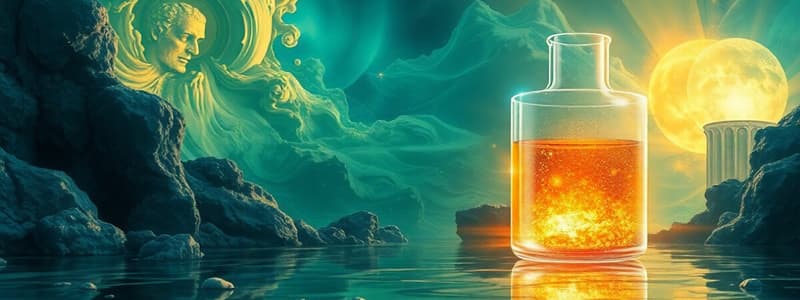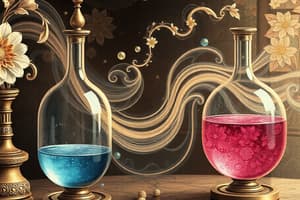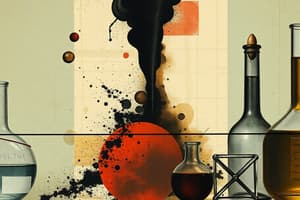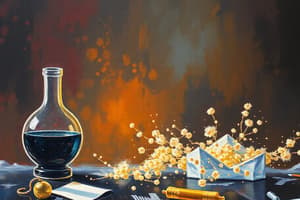Podcast
Questions and Answers
What does Le Chatelier's Principle state?
What does Le Chatelier's Principle state?
- If stress is applied to a system at equilibrium, it will adjust to relieve the stress. (correct)
- Equilibrium cannot be disturbed once established.
- Increased temperature favors the forward reaction in all cases.
- The forward reaction will always favor the reactants.
A catalyst changes the position of equilibrium in a reaction.
A catalyst changes the position of equilibrium in a reaction.
False (B)
Define chemical equilibrium.
Define chemical equilibrium.
A dynamic state in a reversible reaction where the rate of the forward reaction equals the rate of the backward reaction.
According to Le Chatelier's Principle, an increase in pressure will favor the side with the ______ number of molecules.
According to Le Chatelier's Principle, an increase in pressure will favor the side with the ______ number of molecules.
What is the effect of an increase in temperature on an exothermic reaction?
What is the effect of an increase in temperature on an exothermic reaction?
Match the following reactions with their type of heat change:
Match the following reactions with their type of heat change:
Chemical equilibrium can occur only in reactions that are irreversible.
Chemical equilibrium can occur only in reactions that are irreversible.
What does the symbol ΔH signify in a chemical reaction?
What does the symbol ΔH signify in a chemical reaction?
What is the primary industrial use of ammonia?
What is the primary industrial use of ammonia?
The production of ammonia is favored by low pressures.
The production of ammonia is favored by low pressures.
What is the equilibrium constant expression for the reaction of ammonia production?
What is the equilibrium constant expression for the reaction of ammonia production?
Sulfuric Acid is made by dissolving __________ in water.
Sulfuric Acid is made by dissolving __________ in water.
Match the following production processes with their associated conditions:
Match the following production processes with their associated conditions:
Which of the following describes the Haber process?
Which of the following describes the Haber process?
What will happen to the concentration of PCl5 if more PCl3 is introduced?
What will happen to the concentration of PCl5 if more PCl3 is introduced?
Calculate the value of K_c for the reaction at the specified temperature if 13.6 moles of N_2, 1.0 mole of H_2, and 1.5 moles of NH_3 are present.
Calculate the value of K_c for the reaction at the specified temperature if 13.6 moles of N_2, 1.0 mole of H_2, and 1.5 moles of NH_3 are present.
Increasing temperature in an exothermic reaction will shift the equilibrium to the right.
Increasing temperature in an exothermic reaction will shift the equilibrium to the right.
The reaction producing sulfur trioxide in the Contact Process is endothermic.
The reaction producing sulfur trioxide in the Contact Process is endothermic.
What is the color change observed when concentrated hydrochloric acid is added to the iron (III) chloride and potassium thiocyanate mixture?
What is the color change observed when concentrated hydrochloric acid is added to the iron (III) chloride and potassium thiocyanate mixture?
If the pressure is increased in the reaction involving PCl3, Cl2, and PCl5, the equilibrium will shift to the __.
If the pressure is increased in the reaction involving PCl3, Cl2, and PCl5, the equilibrium will shift to the __.
What happens to the equilibrium of the red complex when potassium thiocyanate solution is added to the solution?
What happens to the equilibrium of the red complex when potassium thiocyanate solution is added to the solution?
Le Chatelier's Principle states that if a change is applied to a system at equilibrium, the system will adjust to counteract that change.
Le Chatelier's Principle states that if a change is applied to a system at equilibrium, the system will adjust to counteract that change.
In the Haber process, one of the most important chemicals produced is ______.
In the Haber process, one of the most important chemicals produced is ______.
Match the substances with their role in the experiment:
Match the substances with their role in the experiment:
What happens to the concentration of Fe^3+ ions when KCNS is added to the equilibrium mixture?
What happens to the concentration of Fe^3+ ions when KCNS is added to the equilibrium mixture?
Changing the pressure of a solution at equilibrium will always affect the equilibrium position.
Changing the pressure of a solution at equilibrium will always affect the equilibrium position.
What is the value of the equilibrium constant (K_c) for the given reaction?
What is the value of the equilibrium constant (K_c) for the given reaction?
The reaction between Fe^3+ and CNS^- leads to the formation of __________.
The reaction between Fe^3+ and CNS^- leads to the formation of __________.
Match the temperature change to its effect on the equilibrium and the type of reaction:
Match the temperature change to its effect on the equilibrium and the type of reaction:
What is the equilibrium constant expression for the reaction 2NO (g) ↔ N2 (g) + O2 (g)?
What is the equilibrium constant expression for the reaction 2NO (g) ↔ N2 (g) + O2 (g)?
An increase in pressure will affect the value of Kc for the reaction 2NO (g) ↔ N2 (g) + O2 (g).
An increase in pressure will affect the value of Kc for the reaction 2NO (g) ↔ N2 (g) + O2 (g).
State Le Châtelier's principle.
State Le Châtelier's principle.
In the reaction 2NO (g) ↔ N2 (g) + O2 (g), when 2 moles of NO decompose, the number of moles of N2 at equilibrium is ______.
In the reaction 2NO (g) ↔ N2 (g) + O2 (g), when 2 moles of NO decompose, the number of moles of N2 at equilibrium is ______.
Match the following catalyst metals to their usage in catalytic converters:
Match the following catalyst metals to their usage in catalytic converters:
What happens to the reaction when the temperature is increased in an exothermic reaction?
What happens to the reaction when the temperature is increased in an exothermic reaction?
The reaction 2NO (g) ↔ N2 (g) + O2 (g) is an example of a dynamic equilibrium.
The reaction 2NO (g) ↔ N2 (g) + O2 (g) is an example of a dynamic equilibrium.
Name one way that catalysts increase the rate of reaction.
Name one way that catalysts increase the rate of reaction.
Flashcards
Chemical Equilibrium
Chemical Equilibrium
A state where the rates of the forward and reverse reactions are equal, resulting in no net change in the concentrations of reactants and products.
Reversible Reaction
Reversible Reaction
A reaction where the products can react to reform the reactants, meaning the reaction proceeds in both directions.
Le Chatelier's Principle
Le Chatelier's Principle
If a stress is applied to a system in equilibrium, the system shifts to relieve the stress.
Effect of Pressure Change (Gases)
Effect of Pressure Change (Gases)
Signup and view all the flashcards
Stress (in Equilibrium)
Stress (in Equilibrium)
Signup and view all the flashcards
Exothermic Reaction
Exothermic Reaction
Signup and view all the flashcards
Endothermic Reaction
Endothermic Reaction
Signup and view all the flashcards
Catalyst Effect on Equilibrium
Catalyst Effect on Equilibrium
Signup and view all the flashcards
Haber process
Haber process
Signup and view all the flashcards
Ammonia Production conditions
Ammonia Production conditions
Signup and view all the flashcards
Equilibrium Constant (Kc)
Equilibrium Constant (Kc)
Signup and view all the flashcards
Kc Formula
Kc Formula
Signup and view all the flashcards
Contact Process
Contact Process
Signup and view all the flashcards
Contact Process conditions
Contact Process conditions
Signup and view all the flashcards
Equilibrium Concentration calculation
Equilibrium Concentration calculation
Signup and view all the flashcards
Effect of adding PCl3 on PCl5 concentration
Effect of adding PCl3 on PCl5 concentration
Signup and view all the flashcards
Effect of pressure on PCl5 concentration
Effect of pressure on PCl5 concentration
Signup and view all the flashcards
Effect of temperature on PCl5 concentration
Effect of temperature on PCl5 concentration
Signup and view all the flashcards
Fe3+ + CNS- ↔ Fe(CNS)2+
Fe3+ + CNS- ↔ Fe(CNS)2+
Signup and view all the flashcards
Effect of adding HCl on Fe(CNS)2+ colour
Effect of adding HCl on Fe(CNS)2+ colour
Signup and view all the flashcards
Effect of adding KSCN on Fe(CNS)2+ colour
Effect of adding KSCN on Fe(CNS)2+ colour
Signup and view all the flashcards
Adding KCNS to Fe^3+^
Adding KCNS to Fe^3+^
Signup and view all the flashcards
Effect of Pressure on Liquid Equilibrium
Effect of Pressure on Liquid Equilibrium
Signup and view all the flashcards
Exothermic vs. Endothermic
Exothermic vs. Endothermic
Signup and view all the flashcards
How to Calculate Kc
How to Calculate Kc
Signup and view all the flashcards
Effect of Temperature on Kc
Effect of Temperature on Kc
Signup and view all the flashcards
Effect of Pressure on Kc (Gases)
Effect of Pressure on Kc (Gases)
Signup and view all the flashcards
Catalyst's Role in Equilibrium
Catalyst's Role in Equilibrium
Signup and view all the flashcards
What is Chemical Equilibrium?
What is Chemical Equilibrium?
Signup and view all the flashcards
Why is Equilibrium Dynamic?
Why is Equilibrium Dynamic?
Signup and view all the flashcards
Study Notes
Chemical Equilibrium
- Chemical equilibrium is a state of dynamic balance in a reversible reaction, where the rate of the forward reaction equals the rate of the backward reaction.
- A reversible reaction is one in which the products react to form the reactants. The reactants continuously form products and the products continuously form reactants.
- Le Chatelier's Principle states that if a stress is applied to a system at equilibrium, the system readjusts to relieve the stress. Stress can be a change in concentration, pressure, or temperature.
- In an exothermic reaction, heat is given out (ΔH-). In an endothermic reaction, heat is taken in (ΔH+).
- An increase in pressure in a reaction involving gases favors the reaction that produces fewer molecules, as this reduces volume and relieves the pressure increase.
- Catalysts speed up the rate of a reaction reaching equilibrium but do not change the position of equilibrium.
Le Chatelier's Principle Example: PCI3(g) + Cl2(g) → PCI5(g)
- Introducing more PCl3 will shift the equilibrium to the right, increasing the concentration of PCI5.
- Increasing pressure will shift the equilibrium to the right (fewer gas molecules on the right hand side).
- Increasing temperature will shift the equilibrium to the left (the forward reaction is exothermic).
Mandatory Experiment: Iron (III) Chloride and Potassium Thiocyanate
- Mixing FeCl3 and KCNS solutions creates a red complex (Fe(CNS)2+) according to the equation.
- Adding HCl to the mixture reduces the red color, shifting equilibrium to the left.
- Adding KCNS to the equilibrium solution increases the concentration of red complex.
Industrial Applications of Le Chatelier's Principle
- Haber Process: Manufacturing Ammonia (N2 + 3H2 ⇌ 2NH3) is optimized for high pressure and low temperature to maximize ammonia yield
- Contact Process (2SO2(g) + O2(g) ⇌ 2SO3 ΔH = -196 kJ/mol ) is best at 450°C because it's high temperature to improve catalyst efficiency.
Equilibrium Constant (Kc)
- Kc is a constant that represents the relationship between the concentrations of products and reactants in an equilibrium system.
Exam Question Examples:
- Consider the reversible reaction 2NO(g) ⇌ N2(g) + O2(g). ΔH = -183 kJ
- Calculate the number of moles of nitrogen gas at equilibrium if 2 moles of nitrogen monoxide decompose to nitrogen gas and oxygen gas in a closed container, and the equilibrium constant (Kc) is 20.25.
- Determining the equilibrium constant (Kc) for a given reaction with concentrations of reactants and products at equilibrium.
Stress and Equilibrium Shift
- A stress on the equilibrium will be counteracted by a shift in the reaction direction, whether forward or backward, to alleviate the stress.
Catalysts in Catalytic Converters
- The catalytic converters in cars use metals like platinum, palladium, and rhodium as catalysts.
- These catalysts increase reaction rates—primarily heterogenous catalysis—by lowering activation energy in car exhausts.
Studying That Suits You
Use AI to generate personalized quizzes and flashcards to suit your learning preferences.




